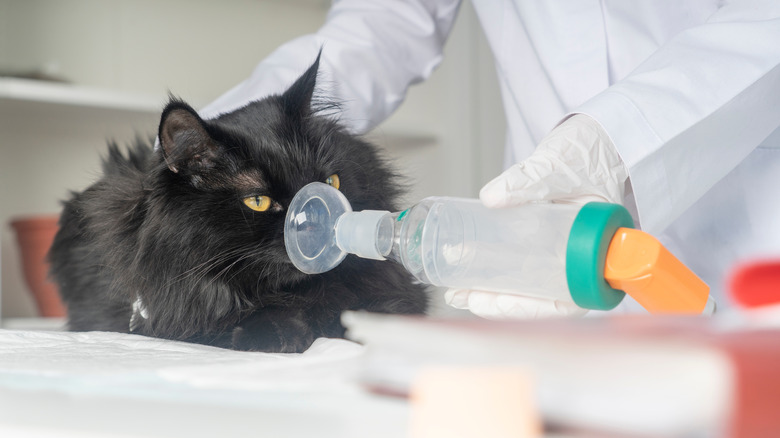Pet Owners Should Keep These Types Of Air Fresheners Out Of Their Home
Plug-in air fresheners are tempting to use, especially in a household with pet smells. However, while they might help keep your home smelling nice, these items can cause hefty damage to your animal companions. Dogs and cats have a much stronger sense of smell than humans, and the overpowering fragrances found in air fresheners often contain toxins that can irritate them. Plug-in air fresheners also typically tend to be placed lower to the ground, granting pets easy access and leading to the potential ingestion of toxic chemicals.
Plug-in air fresheners contain volatile organic compounds (VOCs) due to their high vapor pressure, which allows them to quickly turn from a liquid into a gas or vapor. A 2011 study published in Environmental Impact Assessment Review that examined scented household products, including air fresheners, "found 133 different VOCs emitted from the 25 products, with an average of 17 VOCs per product. Of these 133 VOCs, 24 are classified as toxic or hazardous under U.S. federal laws, and each product emitted at least one of these compounds." Most of these ingredients were not disclosed on the labels. The list of VOCs found in air fresheners includes phthalates, which are toxic to cats, and formaldehyde, which can cause respiratory and skin problems in pets.
Effects of air fresheners on pets
If you've ever noticed your pet leaving the room after plugging an air freshener in, chances are they are impacted by the scent. If your dog or cat keeps sneezing and coughing, taken note, as these are some of the first signs that they are having a reaction to breathing in an air freshener. Other notable symptoms include gastrointestinal issues, lethargy, and discharge in the eyes or nose. Inhaling the chemicals found in air fresheners can also cause respiratory issues, especially in cats. Dr. Patrick Mahaney told PetMD, "Cats have had an increase in feline asthma as a result of living in households where there are air fresheners, incense and cigarette smoke—or even just the aroma of cleaning products."
Along with inhaling the fumes, if your pet happens to get their paws on an air freshener and eat or lick it, there can be consequences. The severity of symptoms will vary depending on what and how much your pet ingests, but gastrointestinal problems, such as throwing up and diarrhea in both dogs and cats, are some of the main outcomes you can expect to see. Your pet could also experience negative effects if they get air freshener fumes on their skin or fur and proceed to groom themselves.
How to keep pets safe and plug-in air freshener alternatives
When it comes to plug-in air fresheners, it's best to avoid them completely if you have pets in the home to prevent any potential issues. However, if you absolutely can't part with your scented plug-ins, take precaution when using them. Never place an air freshener near a spot your pet consistently uses, such as a litter box or their food and water bowls. Also, only plug them into outlets that your pets can't reach. If you notice your pet starting to have any symptoms, it's best to remove the air freshener or move it to a room your pet doesn't go in to.
There are pet-safe alternatives to traditional plug-in air fresheners you can use to make your home smell better. If pet odor is what you're trying to mask, some air purifiers are safe for pets and may help reduce those smells. If you use air fresheners because you enjoy their scent, consider other ways to add fragrance to your home, such as growing pet-safe herbs or burning candles with non-toxic ingredients like beeswax.


